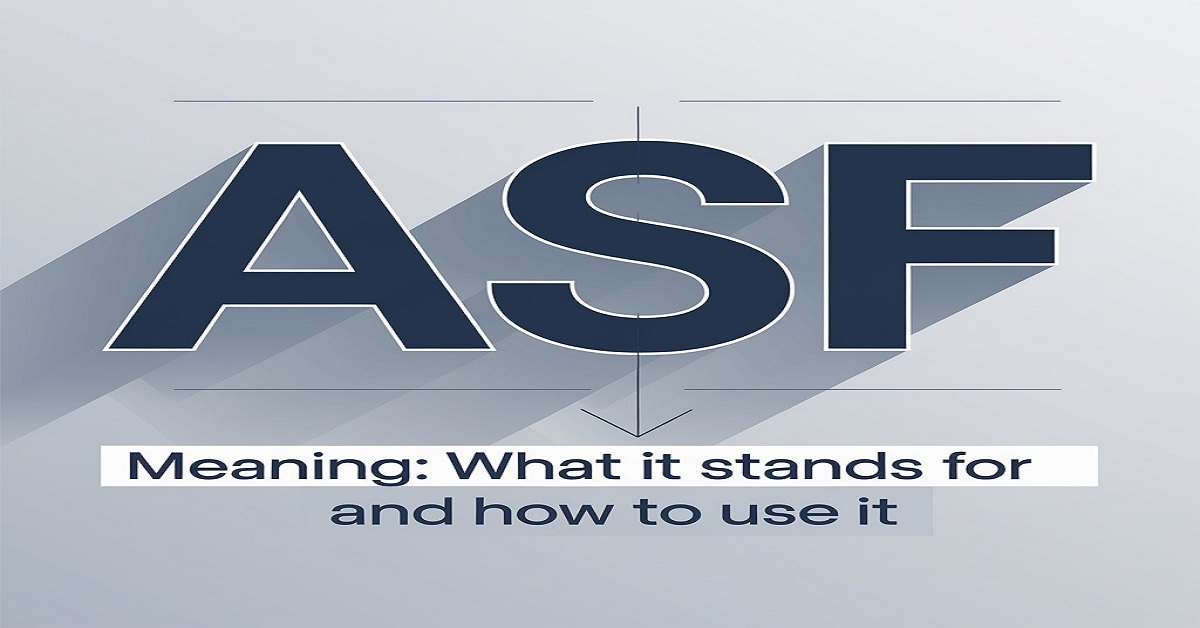If you’ve spent any time online or in conversations with younger crowds lately, you’ve probably encountered the term “ASF.” At first glance, it might seem like just another random acronym or internet shorthand, but trust me, this one packs a punch—literally. ASF, in the slang world, stands for “As Fuck.” And yes, it’s exactly what it sounds like: a way to supercharge whatever you’re talking about.
But before you start slinging this around like it’s your new favorite phrase (which, let’s be honest, it might just become), let’s break it down and have some fun with it. Whether you’re trying to impress your friends or just need to understand what’s behind all the buzz, this article’s got you covered.
What Does ASF Mean?
In simple terms, ASF is a way to emphasize something. It’s like saying “extremely” or “super” but with a little extra spice. It’s typically used to describe an extreme feeling, state, or situation. For example, if you were talking about how tired you are after running a marathon, you might say, “I’m exhausted ASF.” Translation? You’re really, really tired.
But don’t let its simplicity fool you. This little acronym is a big deal in everyday conversations. It adds a bit of flair to otherwise boring sentences and makes them a lot more interesting.
How Do You Use ASF?
Let’s be real: ASF isn’t one of those terms you’re going to use in every conversation, especially if you want to sound professional (unless, of course, you’re a casual CEO—if that exists). But for everyday chats, especially with friends or on social media, it’s your go-to tool for making things sound more exciting.
Here’s how you can throw ASF into your vocabulary with ease:
- For Extreme Emotions
“I’m excited ASF about this weekend’s party!”
Here, you’re taking “excited” to a whole new level. It’s not just excitement; it’s extreme excitement. Your energy is off the charts. - For Physical States
“That workout was hard ASF.”
See what I did there? It’s not just “hard”—it’s as hard as a brick wall, or maybe even harder. Using ASF makes sure no one underestimates your effort. - For Reactions
“That movie was funny ASF!”
Don’t just say something is funny; say it’s hilarious to the point where it might actually make your ribs hurt from laughing too much.
Fun ASF Scenarios: How People Use It
If you’re wondering just how widespread and versatile ASF really is, let me paint you a picture. Imagine you’re hanging out with a group of friends, and someone shows up with a new outfit. Naturally, they ask how they look.
- Friend 1: “How do I look? Does it suit me?”
- Friend 2: “You look fly ASF, girl!”
- Friend 1: “Stop playing, for real?”
- Friend 2: “No lie, you look fire ASF!”
In this case, ASF is being used to hype up the look, making it clear that it’s not just “nice” but extra special.
Other Common Expressions You Can Pair With ASF
ASF isn’t limited to adjectives and emotions. You can also pair it with verbs, nouns, and just about anything you feel like emphasizing. Here are a few more examples:
- “I was running late ASF and missed my flight.” (You were REALLY running late.)
- “That was awkward ASF.” (You get the point—it was super awkward.)
- “My car is fast ASF!” (We’re talking fast to the point where you might need to wear a seatbelt just to sit still.)
Why Do People Use ASF?
You might be wondering, “Why do we need to say things are extreme in this way? Isn’t saying something is ‘really’ enough?” Well, my friend, it’s all about adding flavor. ASF adds a dash of intensity and excitement, making your conversations feel more lively and real. Plus, when you’re speaking to someone who’s into the lingo, they’ll instantly know what you’re talking about and how you’re feeling. It’s shorthand for I’m serious about this.
In other words, it’s the perfect way to exaggerate something in a fun, relatable way without sounding too stiff or boring.
When Should You Avoid Using ASF?
Now, before you start using ASF like it’s your new catchphrase, here’s a quick reminder: context matters. There are definitely times when this acronym might not be the best choice.
- Professional Settings: You probably don’t want to slip in an “I’m stressed ASF” during a work meeting. Keep it professional, people.
- Older Audiences: If you’re talking to someone who’s not as into internet slang or who prefers more traditional language, throwing in an ASF might leave them scratching their head.
- Formal Writing: ASF is fun, but it doesn’t belong in your college essay or job application (unless you’re applying to be the CEO of Cool).
Are There Any Alternatives to ASF?
If you’re not feeling the whole “As Fuck” vibe (or maybe you just don’t want to cuss as much), fear not. There are alternatives you can use to achieve the same emphasis:
- AF (As Frick): For a less explicit version, swap out “frick” for the more PG-rated option.
- Extra: “She’s extra excited today!” A bit less intense but still shows enthusiasm.
- To the Max: “That pizza was delicious to the max.” (Just a different way to show your level of enjoyment.)
- Super/Extremely: Simple but still effective.
These options might not have the same punch as ASF, but hey, they get the job done.
Common Misconceptions About ASF
- It’s Not Offensive
Despite the profanity, ASF isn’t meant to offend. It’s more of a playful expression. However, always be mindful of who you’re talking to. Context, as always, is key. - You Can Only Use ASF With Negative Feelings
ASF can be used for positive or negative emotions, so don’t limit yourself. Feel free to express your excitement, happiness, or even frustration with this little gem. - It’s Just a Gen Z Thing
While it’s true that younger people are more likely to use ASF, it’s far from exclusive to them. People of all ages (especially on social media) have adopted it. It’s the cool new way to amplify anything you’re talking about!
Wrapping It Up: Your New Favorite Acronym
Now that you’re well-versed in the art of using ASF, it’s time to add a little flair to your everyday chats. Whether you’re describing your excitement for a new movie or the exhaustion from a long day, ASF is here to make your language pop.
Of course, like any slang, the key is knowing when and where to use it. You wouldn’t say “I’m starving ASF” at a five-star restaurant, right? Use it in the right context, and you’ll be sounding cooler than your favorite influencer.
So, what do you think? Ready to take your conversations to the next level with ASF? Drop your thoughts in the comments or share your favorite ways to use it. And remember: next time you’re excited, stressed, or just super into something, don’t hold back—let the world know you’re feeling it ASF.
ASF Meaning FAQ: Everything You Need to Know
1. What does ASF stand for?
ASF stands for “As Fuck,” a slang expression used to emphasize the intensity or extreme degree of a feeling, action, or state. It’s a way to add extra flair to your sentences.
2. How do I use ASF in a sentence?
You can use ASF after adjectives or verbs to intensify their meaning. For example:
- “I’m tired ASF after that workout.”
- “That party was fun ASF!”
- “The traffic was slow ASF this morning.”
3. Can I use ASF in formal settings?
ASF is casual and definitely not suitable for professional or formal settings. It’s best reserved for informal conversations, texts, or social media posts with friends who are familiar with slang.
4. Is ASF only used by younger people?
While it’s especially popular among Gen Z, ASF is used by people of various ages, particularly in online communities or among friends. It’s become part of the modern slang toolkit, but context always matters.
5. Are there any other ways to say ASF?
Yes! If you want a slightly cleaner version, you can use alternatives like “AF” (As Frick), “extra,” “to the max,” or simply “super” and “extremely.”
6. Is ASF offensive?
Although ASF includes a swear word, it’s generally not meant to be offensive. It’s more of a playful expression to amplify a feeling or statement. However, be mindful of your audience—some people might find it inappropriate depending on the context.
7. Can I use ASF for positive emotions?
Absolutely! ASF can be used for both positive and negative feelings. Whether you’re super happy, excited, or annoyed, ASF adds intensity to whatever emotion you’re expressing.
8. When is it inappropriate to use ASF?
Avoid using ASF in formal writing, professional settings, or when speaking to people who aren’t familiar with casual internet slang. Also, it’s best to avoid it around people who may find it offensive.
9. Why is ASF so popular?
ASF is popular because it’s a fun, easy way to exaggerate emotions and reactions. It’s become a shorthand to add energy to conversations, making them more expressive and engaging.
10. Can I use ASF in text messages?
Definitely! Texts, tweets, and social media posts are perfect places to drop an ASF and show your excitement or frustration. It’s all about context—just make sure your friends get it!

Tony James is a passionate wordsmith and the creative force behind Winky Hive. With a knack for uncovering the stories behind slang and weaving emotions into poetry, Tony brings a unique voice to every piece he writes. A lifelong lover of language, he thrives on exploring how words evolve, connect, and inspire.
When he’s not penning articles or crafting verses, Tony enjoys diving into cultural trends, reading classic poetry, and discovering hidden gems in modern expressions. His mission? To make Winky Hive a haven for those who love the art of language in all its vibrant forms.









